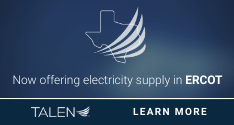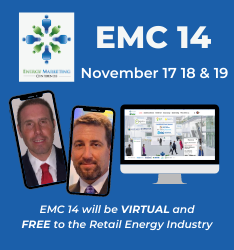|
|
|
|
|
Most ESCOs Oppose New York DPS Staff Whitepaper's Proposed $500,000 Level For ESCO Security
The following story is brought free of charge to readers by EC Infosystems, the exclusive EDI provider of EnergyChoiceMatters.com
Several ESCO groups warned the New York PSC that a proposed minimum $500,000 level for ESCO security, as proposed in a Department of Public Service Staff whitepaper, would preclude smaller retail suppliers from participating in the market
As exclusively first reported by EnergyChoiceMatters.com (see full details here), Staff proposes that ESCOs be required to obtain a financial assurance requirement that is equal to $500,000 or 10% of the ESCO’s annual revenues, whichever is higher. The purpose of the new financial assurance, part of the PSC's retail market reset order, is to ensure that any customers that are harmed by ESCOs are made whole, to the extent possible, in cases of harm such as a failure on behalf of the ESCO to honor the terms of the customer agreement, violations of the UBP, or violation of other Commission orders, rules, and regulations.
The New York Retail Choice Coalition (NYRCC) warned that Staff's proposed $500,000 baseline financial assurance, "will have the unintended consequence that both Staff and the Commission repeatedly stated they wanted to avoid: being so onerous that the financial assurance requirements will effectively preclude small ESCOs from participating in the ESCO market."
"As a matter of public policy, this will lead to a decrease in competition and consolidate the marketplace amongst larger ESCOs who tend to be out of state companies," NYRCC said
NYRCC called Staff's proposed security level, "unnecessarily high," given the limited purpose of the financial assurance (covering obligations to customers).
The NYRCC proposes that the base financial assurance amount be the higher of (i) $200,000 or (ii) 5% of gross receivables from residential and mass market customers.
In separately filed comments, Energy Technology Savings, Inc. d/b/a Logical Buildings also said that the $500,000 proposed baseline for security may prevent smaller ESCOs from participating in the market
"Requiring a small ESCO to put aside $500,000 will create a financial strain on smaller ESCOs and is excessive and unnecessary. This amount may eliminate any profit some smaller ESCOs may earn. The ESCO is unable to use those funds to conduct their business, which may make it impossible for them to continue serving their customers," Logical Buildings said
"[T]he amount of financial assurance required should be directly related to the provider’s level of risk and be based on the number of customers, revenue earned and other risk factors," Logical Buildings said
"The whitepaper as written, favors large ESCOs with more financial resources than many small to medium sized ESCOs. These large ESCOs also present a higher level of risk due to the higher number of customers being served, and therefore should be required to put up more collateral than smaller ESCOs. The suggested approach results in small and medium sized ESCOs being required to put up collateral for the possible losses caused by sizeable ESCOs with a large customer base," Logical Buildings said
"In addition to matching the financial assurance requirement to the level of risk, it is equally important to consider grandfathering from these new requirements those ESCOs that have been operating in New York for years without a history of customer complaints or inflated rates. If such grandfathering does not occur, it is probable that many smaller ESCOs will be forced to discontinue providing energy supply services. It is unfair to place a new burden on smaller, reputable ESCOs because of the acts of a few bad ESCOs. If the good behavior of a grandfathered ESCO should come into question for some reason, there can be a trigger to require financial assurance at that time. If no consideration is given to a grandfathering process up front, there should at least be an appeal process for existing, small ESCOs. This process should consider the history of complaints in order to obtain relief for smaller ESCOs with a proven track record and minimal risk of causing large financial losses that would need to be recovered on behalf of customers," Logical Buildings said
NYRCC noted that not all products pose the same risk, and any security requirement should reflect such differences.
"The type of product the customer purchases from an ESCO and the ESCO itself are two significant factors affecting a customer’s reasonable risk of financial harm. The December 2019 Order permits ESCOs to offer three types of products (once its provisions are effective). The two products that will include provisions for a true-up, the guaranteed savings product and the 5%-capped-fixed-rate product (together, 'Guaranteed Savings Products,') present a higher financial risk to customers than products that do not require a true-up of rates charged to customers (i.e., a 50% renewable product or a commodity product bundled with an approved energy-related value-added product or service)," NYRCC said
In contrast, the NRG Energy retail companies supported, for mass market service, a $500,000 security requirement.
"This amount strikes a fair balance in terms or accomplishing
the Commission’s goals while not being unduly burdensome to the industry," NRG said
However, the NRG retail companies disagree with Staff’s alternative option of 10% of an ESCO’s
annual sales if higher than the proposed $500,000 for financial assurance. "Calculating sales (and
recalculating annually or whenever a threshold event is met) would make this process much more
complicated and time consuming. Should the Commission elect to adopt this recommendation, the
NRG Retail Companies urge the Commission to provide greater clarification on this alternative.
Specifically, it is not clear (1) if the annual revenues at issue will be limited to New York state
revenues derived from the ESCO’s sales to mass-market customers, or (2) how often the amount
of financial assurance will be recalculated," NRG said
The NRG retail companies also support an additional financial assurance amount of
$500,000 for ESCOs utilizing door-to-door marketing to enroll mass market customers.
Form Of Security
ESCOs opposed Staff's proposal to exclude surety bonds as an acceptable form of security
As previously reported, Staff’s preferred form of financial assurance is an irrevocable letter of credit.
The Retail Energy Supply Association noted, in arguments that were also made by other ESCO parties, that Staff ignored the cost imposed on ESCOs from an irrevocable letter of credit
While Staff cited the apparent cost for an irrevocable letter of credit of 1% of its face value, RESA said that this characterization, "ignores that fact that in order to receive the letter of credit, an ESCO has to post collateral with the financial institution."
"Banks typically require a pledge of securities or cash in order to secure the letter of credit -- merely paying 1% of the face value is not enough for a bank to issue such a letter," RESA said
RESA encouraged the Commission to accept surety bonds as a viable form of financial assurance.
Similarly, NYRCC said that to the extent ESCOs are required to provide financial assurance, they should be permitted to do so in a variety of ways, including the use of commonly used financial instruments such as surety bonds. NYRCC noted that surety bonds, "are widely used by regulated entities throughout the State and are also a form of acceptable financial assurance for State contractors doing business with State Agencies."
The NRG retail companies believe the Commission should accept surety bonds as a
means of providing financial assurance. Surety bonds are accepted in most other jurisdictions with
retail markets.
NRG also said that the Commission should consider an ESCO to
have adequate financial integrity and therefore be able to meet financial assurance obligations if
the ESCO or its parent corporation has:
(a) Positive working capital as of the end of the most recent fiscal year OR debt
service coverage equal to or greater than two times the ((adjusted annual earnings
before interest, taxes, depreciation, and amortization) divided by (annual interest
expense)) based on the most recent fiscal year;
(b) positive stockholder equity as of the end of the most recent fiscal year OR
positive working capital as of the end of the most recent fiscal year or a dedicated
source of additional financing including a line of credit, a pending stock issuance
or debt issuance, or other committed source of financing . . .
However, the Joint Utilities, "strongly support," Staff’s recommendation that the Commission adopt Uniform Business Practices requiring the ESCOs to provide financial security in the form of an irrevocable Letter of Credit.
"If the Commission accepts any additional form of financial security, as Staff suggests, it should be limited to a Parental Guarantee from a company with an investment grade credit rating. Staff correctly concluded that other forms of security, such as surety bonds, should not be considered acceptable forms of financial security," the Joint Utilities said
The Joint Utilities also said in comments that they, "continue to stress the need for immediate modifications to the
UBPs to allow the utilities to obtain additional financial security from ESCOs to protect the utilities and customers from financial risk. The current inadequacy is particularly significant in regard to Natural Gas Imbalance Risks."
Case 15-M-0127 et al.
ADVERTISEMENT Copyright 2010-20 Energy Choice Matters. If you wish to share this story, please
email or post the website link; unauthorized copying, retransmission, or republication
prohibited.
ESCOs Warn $500,000 Level For Security Would Preclude Small ESCOs From Participating In Market
NRG Supports $500,000 Security Level
August 26, 2020
Email This Story
Copyright 2010-20 EnergyChoiceMatters.com
Reporting by Paul Ring • ring@energychoicematters.com
NEW Jobs on RetailEnergyJobs.com:
• NEW! -- Sr. Sales Executive -- Retail Supplier
• NEW! -- Energy Systems Analyst -- Retail Supplier
• NEW! --
Billing Specialist -- Retail Supplier
-- Texas
•
Retail Energy Account Executive -- Houston
•
Business Development Manager
|
|
|
|









